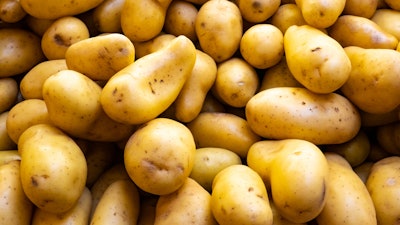
EAST LANSING, Mich. — A new genetically engineered potato developed by Michigan State University potato breeder Dave Douches has been granted exemption from the biotechnology regulations placed on genetically modified products by the U.S. Department of Agriculture’s Animal and Plant Health Inspection Service (USDA APHIS).
The Kal91.3 potato is bred from an MSU potato variety named Kalkaska. The newly developed potato can be stored in cool temperatures for long periods of time without sucrose, the compound that sugar is typically stored in potatoes as, converting into reducing sugars such as fructose and glucose. Without as many reducing sugars, off-color browning and caramelization can be minimized in the Kal91.3 potato, leading to healthier and higher-quality products, including potato chips.
The Kal91.3 potato can also reduce the environmental impact of the growing process without as many fertilizers and pesticides needed to maintain the potato during storage.
Sucrose is broken down in potatoes by vacuolar acid invertase, an enzyme reactive to the external environment of plants — such as temperature. Roughly 10 years ago, Jiming Jiang, an MSU Foundation Professor in the departments of Horticulture and Plant Biology, published findings on how to silence, or suppress, the gene that produces vacuolar acid invertase in potatoes.
This discovery sparked interest from Douches, a professor in the Department of Plant Soil and Microbial Sciences and director of the MSU Potato Breeding and Genetics Program, to find a way to correct the sugar imbalance that can occur in some of Michigan’s commercial chipping potatoes.
After multiple experiments carried out from 2014-2015, Douches developed an RNA interference (RNAi) construct that silenced vacuolar acid invertase in Kalkaska potatoes.
From 2016-2023, Douches tested the agronomic characteristics of the Kal91.3 potato and found it had a good shape, size and specific gravity — the measurement of starch content compared to water in the potato.
Historically, many farmers have stored chipping potatoes at or around 50 F to avoid vacuolar acid invertase from responding to cooler temperatures and converting sucrose into reducing sugars, but doing so has left potatoes more susceptible to storage rots and moisture loss. The Kal91.3 potato, however, has shown the ability to be stored at 40 F while maintaining its sugar balance.
In January, Douches received notice from USDA APHIS that the Kal91.3 potato proved not to pose an increased plant pest risk relative to its conventionally bred counterpart, thus making it exempt from the biotech regulations USDA APHIS imposes on other genetically modified products. This news meant regulators from USDA APHIS concluded that the Kal91.3 potato could’ve otherwise been developed using traditional breeding techniques.
The Kal91.3 potato isn’t the first genetically engineered potato with invertase silencing to be exempt from regulation by USDA APHIS. However, it’s the first genetically engineered vegetable developed by a land-grant university to be exempt from regulation, according to the USDA APHIS website.
Douches and his team are now working with Michigan potato industry leaders to evaluate the potential impact the Kal91.3 potato might have on the state’s industry, specifically with chipping.






















